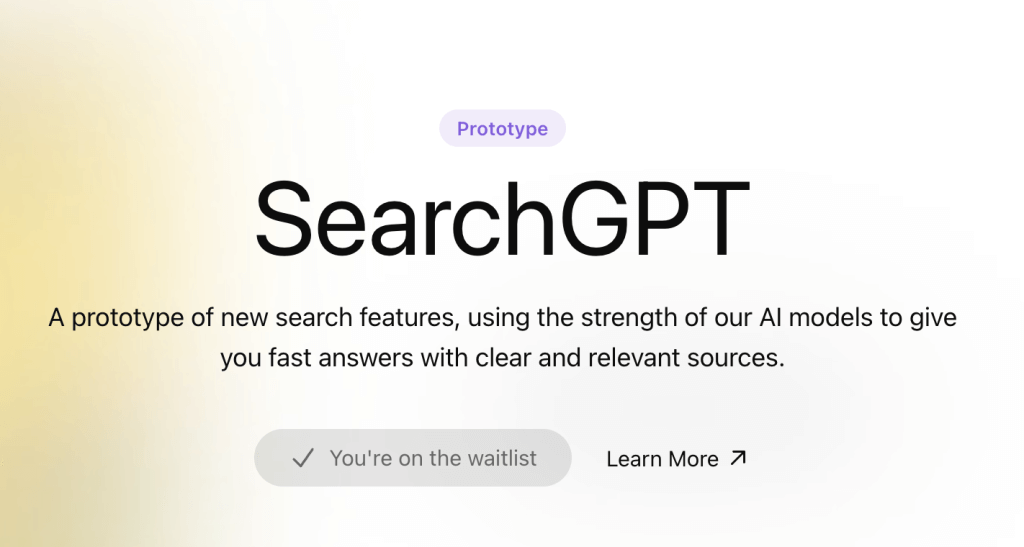The recent announcement of OpenAI’s SearchGPT prototype marks a significant development in the evolving landscape of search technology. I’ve been waiting for this, as has anyone paying attention to the world of search and search engine optimization. And there is every reason to believe this move has a good chance of disrupting the search engine market, long dominated by giants like Google, and usher in a new era of AI-powered information retrieval.

SearchGPT represents a bold step forward in merging advanced language models with real-time web information. Unlike traditional search engines that return a list of links, SearchGPT aims to provide direct, conversational answers to user queries, complete with clear attributions and source links. This approach could fundamentally change how users interact with and consume information online.
Key Features and Implications of SearchGPT
Some of the key features and implications of SearchGPT include:
Conversational Interface. As we move into an era that will no doubt be defined by voice search and queries, SearchGPT’s natural language processing capabilities allow for a more intuitive search experience. Search GPT users can ask follow-up questions, mimicking a human conversation, which could lead to more efficient and satisfying search sessions.
Direct Answers. By attempting to provide concise, relevant answers rather than just links, SearchGPT could save users time and reduce the need for multiple searches or webpage visits. This feature may be particularly appealing in an age of information overload. And we are already seeing these capabilities featured in Google’s search engine as well as in use by Perplexity, so this isn’t exactly breaking new ground, but it is for certain the path forward.
Publisher Partnerships. OpenAI’s collaboration with major publishers like The Wall Street Journal, The Associated Press, and Vox Media is a strategic move, addressing potential copyright and content use concerns upfront, potentially avoiding the controversies faced by competitors like Perplexity.
Attribution and Transparency. SearchGPT’s emphasis on clear, in-line attribution and prominent linking to sources is crucial. It not only provides transparency for users but also aims to drive traffic to publishers’ websites, addressing a key concern in the digital publishing industry. As a publisher myself, I find this extremely important. And, as a researcher who is instantly frustrated if I can’t find source links and attributions, this is both a credibility and a transparency factor that I find crucial.
Visual Answers. While details are still sparse, SearchGPT’s inclusion of visual elements in search results could enhance user experience and information comprehension.
Market Impact and Challenges of Search GPT
I mentioned this earlier, but anyone who has been paying even a modicum of attention to the transformation of the search industry that generative AI is bringing and will continue to bring knows that this is a significant moment in time on an industry-wide basis. SearchGPT’s entry into the search market could pose a significant challenge to established players, particularly Google. The tech giant has been scrambling to integrate AI features into its search engine, aware of the potential threat posed by AI-driven alternatives. OpenAI’s move could accelerate this AI arms race in search technology.
That said, SearchGPT faces several challenges. These include:
Accuracy and Reliability. As with any AI system, ensuring the accuracy and reliability of information will be crucial. SearchGPT’s initial prototype phase will be critical in identifying and addressing potential issues.
Scalability. SearchGPT is currently limited to 10,000 test users and scaling the service to a broader audience while maintaining performance and accuracy will be a significant technical challenge. That said, OpenAI is well-funded, so tackling this technical challenge with the funds and talent necessary should already be underway.
Monetization. With no apparent ad model in place for SearchGPT, OpenAI will need to develop a sustainable monetization strategy, especially given the high compute costs associated with AI models. Today’s enterprise apps have become a little like streaming platforms: we’re spending $20 here, $20 there, and another $20 there. The challenge for SearchGPT on a monetization front will be serving up a product that is so amazing that users will fork over money to use it rather than using Google (or Bing) search engines at no cost.
User Adoption. Convincing users to switch from familiar search engines to a new, AI-driven platform may require significant marketing efforts and demonstrable advantages. I feel like this is one of the biggest challenges for SearchGPT ahead. Modifying user behavior is one of the most difficult things there is — I’ve spent a career working doing that, or trying to anyway, in more instances than I can count. Google is the gold standard for search queries, and trying to raise awareness about another option is a significant challenge, as is actually seeing adoption happen. This will be a long road ahead.
Ethical and Legal Considerations. As AI-generated content becomes more prevalent in search results, navigating the complex landscape of copyright law and content ownership will be an ongoing challenge.
Future Outlook for SearchGPT
The launch of SearchGPT as a prototype is a smart move by OpenAI. It allows for real-world testing and refinement before a broader release. The company’s plan to eventually integrate these search features into ChatGPT could create a powerful, unified AI assistant capable of both generative tasks and information retrieval.
As mentioned the success of SearchGPT could potentially reshape the search engine market, pushing competitors to accelerate their AI integration efforts. It may also lead to a shift in how digital content is created, consumed, and monetized.
For publishers and content creators, SearchGPT presents both opportunities and challenges. While it promises to drive traffic and discovery, it may also change how users interact with content, potentially affecting traditional pageview and advertising models. And that, my friends, has the attention of many in the industry, as this could represent signicant changes to search, discovery, as well as to SEO and paid advertising strategies.
In conclusion, SearchGPT represents a significant step toward AI-driven search experiences. Its success will depend on its ability to deliver accurate, timely, and valuable information while navigating the complex relationships between AI technology, content creators, and users. As the prototype evolves and expands, it will be fascinating to observe its impact on the search market and the broader digital ecosystem. Join the waitlist for SearchGPT here.
See more of my coverage here:
Combatting the Cybersecurity Risks Posed by Enterprise Collaboration Tools
AWS Summit NY: AWS Bolsters its Generative AI Stack
Qlik Announces GA of Qlik Talend Cloud, Marking Significant Milestone in Data Integration



